Can Babies Wear Sunscreen with Rebecca Hartman, MD MPH
In this episode we're talking about:
- How chemical sunscreens are different from mineral sunscreens…and why to avoid oxybenzone
- Why sunscreens are not recommended for babies under 6 months of age…but what you can do instead
- How spray sunscreens differ from lotions and safety considerations when applying both to children
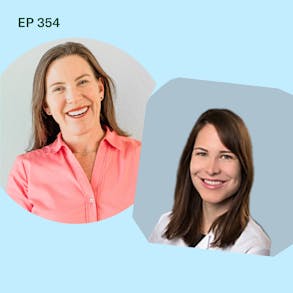
LISTEN TO THIS EPISODE
Episode Description
Can babies wear sunscreen? You know that saying, “When in doubt…leave it out.” But is sunscreen harmful for babies under the age of 6 months? My guest in this episode is Rebecca Hartman, she’s a dermatologist and mom of 2. In this interview Dr. Hartman shares information about the difference between chemical sunscreens and mineral sunscreens, with her own personal mom insight on why she doesn’t use chemical sunscreens for her kids.
Dr. Hartman has a conflict of interest to disclose. She is a Mom in Medicine with Evereden and a Scientific Advisor for the company and receives consulting fees from them. Her views on this podcast are her personal views and do not represent those of Dana Farber Cancer Institute.
About the Guest
- Rebecca Hartman, MD, MPH is a dermatologist and a baby-led weaning mom of 2

- Dr. Hartman is on the Evereden Moms in Medicine team and helps select nontoxic ingredients for their products

Links from this Episode
- Shop Katie’s favorite Evereden nontoxic skincare products here (affiliate link) and use affiliate discount code KATIE15 for 15% off: http://shrsl.com/3dib0

- Baby-Led Weaning with Katie Ferraro program with the 100 First Foods™ Daily Meal Plan, join here: https://babyledweaning.co/program
- Baby-Led Weaning for Beginners free online workshop with 100 First Foods™ list to all attendees, register here: https://babyledweaning.co/baby-led-weaning-for-beginners
Other episodes related to this topic:
- Episode 129 - Exploring the Eczema & Food Allergy Risk Link with Rebecca Hartman, MD, MPH https://blwpodcast.com/episodes/129

Latest Episodes
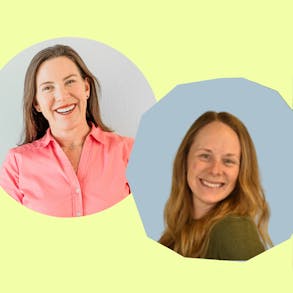
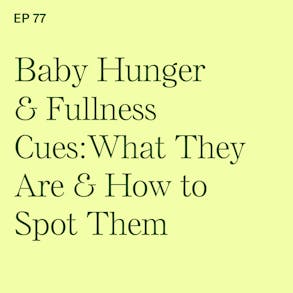
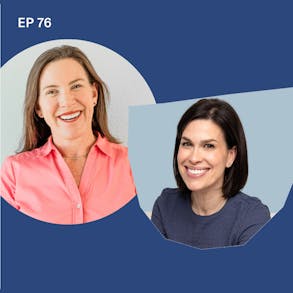
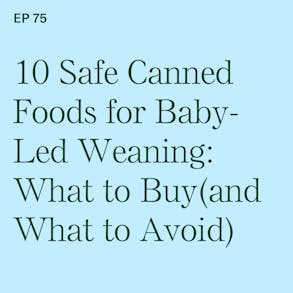
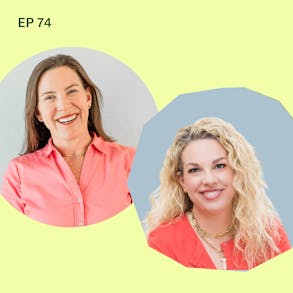
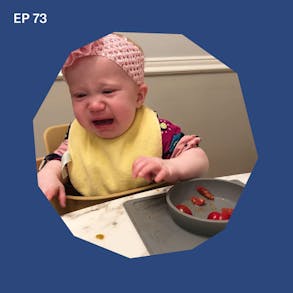
Rebecca Hartman (1m 14s):
I always say sub protection's at team sport. So there's shade, there's the protective clothing. Trying to avoid the peak sun in the middle of the day when it's the strongest, right? Like Babies take a nap, you know, usually in the middle of the day so they can avoid that while they're napping. Sunscreen you sparingly. You know, I think the alternative of a bad sunburn in a young baby's far worse than the potential harm of using a little bit of Sunscreen.
Katie Ferraro (1m 33s):
Hey There, I'm Katie Ferraro, Registered dietitian, college nutrition professor and mom of seven specializing in babyled weaning here on the BabyLed weaning Made Easy podcast. I help you strip out all of the noise and nonsense about feeding, leaving you with the confidence and knowledge you need to give your baby a safe start to solid foods using babyled Weaning Can babies wear sunscreen. I know you guys know that saying When in doubt, leave it out. But is Sunscreen actually harmful for Babies under the age of six months? My guest today is Rebecca Hartman. She's a dermatologist and a mom of two.
Katie Ferraro (2m 14s):
She's been on the podcast previously where we were talking about the link between severe Eczema and food Allergy. So she did babyled weaning with her oldest who has severe Eczema. He has a cashew Allergy. They actually did oral immunotherapy with him starting at 20 months. So she's gonna mention and talk a little bit about that in this interview. But Dr. Hartman's also getting ready to start solid foods with her daughter who's gonna turn six months soon. But I had her on the podcast today to talk about Sunscreen and in particular Sunscreen for Babies. So she's going to share some information about the difference between chemical sunscreens and mineral sunscreens with her own personal mom insight on why she doesn't use chemical Sunscreen for kids. And I do want to mention that Dr. Hartman does have a conflict of interest to disclose.
Katie Ferraro (2m 56s):
She is a mom in medicine with the brand Evereden and she's a Scientific Advisor for the company and receives consulting fees from them. So Her views on this podcast are her personal views and do not represent those of the Dana-Farber Cancer Institute and Dr. Hartman's role with Evereden. She also helps select the ingredients for their Evereden product lines, including their mineral Sunscreen. So I am an affiliate forever. Ever Eden as well. I do use their non-toxic skincare products for myself and my kids. And I was so excited when they came out with their line of mineral sunscreens for kids. So I wanted to have Dr. Hartman on to talk about like, okay, kids are fine six months and up, we know. But what about Babies prior to six months of age?
Katie Ferraro (3m 36s):
Can they wear Sunscreen? So If, you do want to check out Ever Eden's mineral sunscreens or any of their non-toxic skincare products. My affiliate code is KATIE15 and that works for 15% off. And I'll link to all of my favorites for Babies in the description where you are listening. So with no further ado, here is Dr. Rebecca Hartman talking about whether or not Babies can wear Sunscreen.
Rebecca Hartman (4m 1s):
Hello. Thank you so much for having me. Very excited to be back.
Katie Ferraro (4m 4s):
Last time you were here we were talking about Eczema and the link between severe Eczema and peanut Allergy risk. And you shared that your own son, he at that time he was just going through doing babyled weaning, he'd had severe Eczema. You found out he had, I know a cashew Allergy and know it was so encouraging for parents to hear this from you and you're like gosh, these things also happen to a dermatologist. So just checking in, how is your son doing with his food Allergy situation now? Oh
Rebecca Hartman (4m 28s):
Well thanks for checking in and remembering about him. So he's great. He's almost three, which is crazy. Time flies. And he's actually doing amazing from a food Allergy standpoint. We found an amazing allergist and started oral immunotherapy for him right around 20 months and he's done great with it. He's actually had no reactions at all during up dosing and he now just takes a teaspoon of cashew a day. We're still keeping it out of his diet and one thing that we're really proactive about is keeping other potentially Allergenic foods that he's not yet Allergenic to in his diet. So we actually do this thing every night called nut bar. Our son probably thinks it's normal but I'm sure other people don't do it where we give him a teaspoon of a different, like a teaspoon of a different nut butter every night just to maintain his other allergens.
Rebecca Hartman (5m 10s):
'cause I actually have two friends with kids that are now like around four and they both separately got different nut allergies like later in life, one to four obviously not really late in life but from a a young child standpoint to walnut and to hazelnut because those are just like kind of unusual nuts that might not be in your diet every day. So I think you know, people think we don't have a total answer of how long you should do this, but I'm gonna keep doing it until he's five.
Katie Ferraro (5m 35s):
Okay. And that's the hard thing about food allergies, right? There's so much gray area where it's like, okay, well the research doesn't say exactly how many grams we need to be doing, but that's the protocol that you guys have been following and that's just wonderful to hear that he's able to to do the teaspoon of nut. And is it he only has a cashew Allergy or does he have other known food allergies as well?
Rebecca Hartman (5m 52s):
At one point we thought he had many food allergies because he got contact hives to a bunch of different foods we introduced. But we have found amazing allergist who helped us sort it out and it's really just cashew and then pistachio cross-react with cashew. He's actually never had pistachio so, but to us it's cashew pistachio. So
Katie Ferraro (6m 7s):
The pistachio is not in the nut bar,
Rebecca Hartman (6m 10s):
No pistachio's not in the nut bar. So we avoid those well except we give a teaspoon of cashew a day. I mean we're very lucky those allergens aren't that commonly encountered like inadvertently. I have a friend with Sesame Allergy and that's like in every, you know, it's really hard. It's just really hard.
Katie Ferraro (6m 25s):
So much sesame Allergy drama right now with all the food manufacturers saying it's in there but it's not 'cause they don't wanna cook on different equipment. I'm like families with food allergies deal with so much. But I love that you guys are pushing through I we're gonna do some content on O I T because of this new data that's showing that you know, earlier use of the oral immunotherapy. Like in your situation you started 20 months but you were telling me before you would've started even earlier. So since the last time we met, you have another baby, your daughter is five months of age. Have you guys done any food Allergy stuff with her yet or you're waiting till six months? What are your thoughts?
Rebecca Hartman (6m 55s):
So as you may remember from last time, we're big fans of babyled weeding. Actually today's a really monumental day because our, our nanny gave her for the first time actual food 'cause she's showing interest in grabbing things and she grabbed some watermelon and she really enjoyed it. So that was really cool. But for, because she has the big brother with the allergies, we've been super aggressive and even around like three months we started to just give her little amounts of nut butter thin with breast milk like on a fingertip just for her to suck on because we really liked babyled weeding for our son, our son besides the allergies, an amazing eater. He will eat anything. He likes olives, he likes all sorts of foods and I think it's because we did the babyled wean+ing. He's not picky at all. It's fantastic. I mean of course he likes the kid foods that all kids like french fries, chicken nuggets.
Rebecca Hartman (7m 36s):
But he has a great palate. Our daughter, we started with the allergens right away just because of the big brother we were. We wanted to be really aggressive about it. And she's done great so far, knock on Wood, no issues.
Katie Ferraro (7m 45s):
Did you do Cashew butter with her?
Rebecca Hartman (7m 47s):
We did, yeah we bought a cashew butter that we keep like high up in the drawer in a, just like a little packet. 'cause we're like well how else will we, you know, we're not gonna put this in anything else. But I did. I was nervous for that one. I was a little nervous. I ha I was ready to like, you know, jet to the hospital if we needed to, but she did fine.
Katie Ferraro (8m 2s):
Hate to switch gears but we're here to talk about Sunscreen babyled, weaning mom, you guys, her older son, she's sharing a situation with Eczema. She said her current baby does not have Eczema. So like in the past we've been Exploring the Eczema and food Allergy risks, but today we're talking about Sunscreen and as a dermatologist I'm like, I've been dying to get in touch with you 'cause at the time of this recording we're heading into the summer season and parents ask, you know the question all the time, is it okay for Babies to wear Sunscreen as a mom who is has small kids and is a dermatologist? What are your thoughts on Sunscreen For Babies?
Rebecca Hartman (8m 32s):
I think I would be banned for the dermatology community if I didn't tell you about the benefits of Sunscreen. So dermatology, we of course love Sunscreen because we see the downstream effects of the sun causing cancer and causing severe problems for people that can be life threatening. And we, we know that young children and Babies their skin is more sensitive to the sun. So they're mu at much higher risk for sunburn. Their skin actually has different structure than adult skin and they're really high risk to get a sunburn. And the problem when a baby gets a sunburn a young baby is that they can't regulate their temperature as well. They can't regulate their water intake as well so they can get dehydrated. So the consequences of a bad sunburning a young baby are much worse than, you know, I, I don't like a bad sunburn. I haven't gotten one knock Wood in years, but much worse for a young baby.
Rebecca Hartman (9m 14s):
That said, there are some thoughts about Sunscreen in young kids. So in general we try to avoid putting Sunscreen on this skin in Babies younger than six months. And this is because their skin is just so sensitive and also it just absorbs things put on it, you know, to a different degree than older, older children or adult skin. So the general recommendations, younger than six months or to keep Babies out of the sun using shade and protective clothing, you may use Sunscreen sparingly to limited areas that you can't protect. But the, I generally try to avoid Sunscreen on Babies younger than six months after six months. The recommendation is to use Sunscreen and use it, you know, liberally when you need it because we wanna avoid a sunburn in young children both because of the potential consequences of dehydration and their ability to regulate their temperature and also to prevent long-term effects of photoaging and skin cancer.
Katie Ferraro (10m 0s):
So there's a mom who's in one of our programs, she was doing a 100 first foods with her baby Skylar and they live on a boat. So we were working with them and showing them how to, you know, make all the different a 100 foods in the program in a really small space. But like in real life they are exposed to sun a lot more than your typical baby. And so she's like, I, she was always asking me like, I don't know, I'm not a dermatologist as a mom, you hear no Sunscreen on Babies less than six months. But like is it harmful or is it just that like When in doubt, leave it out 'cause we don't really know if it's okay for this population. 'cause of course it's not ethical to maybe design a study where you get one baby sunburn and one baby you put Sunscreen on and see which one is worse. Like is it gonna hurt the baby?
Rebecca Hartman (10m 39s):
Exactly. Good, good luck designing that study and getting, getting Moms to put their Babies in that study. Yeah, so I would go more the latter, like we just don't really know. I think it's out of an abundance of caution in this younger age group where we know their skin is more absorptive. But I what I would say for this person living on a boat, which by the way sounds like a fabulous life. So if they, if they wanna, until
Katie Ferraro (10m 57s):
That baby starts walking and then I'm like, oh my gosh, you guys
Rebecca Hartman (10m 60s):
Are gonna, well yeah, right then baby overboard is not a good, but you know, there's other things you could do. I always say sun protection's a team sport. So there's shade, there's the protective clothing trying to avoid the peak sun in the middle of the day when it's the strongest, right? Like Babies take a nap, you know, usually in the middle of the day so they can avoid that while they're napping. But Sunscreen use sparingly. You know, I think the alternative of a bad sunburn in a young baby's far worse than the potential harm of using a little bit of Sunscreen.
Katie Ferraro (11m 26s):
Hey, we're gonna take a quick break, but I'll be right back.
Katie Ferraro (11m 35s):
4 So let's say we're, we're coming up on the six month mark, you're considering a sun protection product for your baby.
Katie Ferraro (12m 25s):
What are the ingredients that you want to avoid or make sure are included in the product? Like I always, you know, you hear about zinc, but I think like picking a product can be really confusing for parents, especially when they're reading labels of products like that. So teach us a little bit about ingredients we want in Sunscreen or don't want in Sunscreen for our Babies.
Rebecca Hartman (12m 42s):
Great question. I, I totally agree. I get overwhelmed when I look at all the products at the store. So the main things with Sunscreen, you want broad spectrum, meaning it blocks both UVA and UVB, which are two different wavelengths of ultraviolet radiation that can cause sun damage and sunburn. And then at least, I usually say at least SPF30 - the SPF sun protection factor is derived by how much of the UVV raises are blocked and there's actually diminishing returns. So SPF30 blocks, 97% of the UVB raise, you never can quite get to a hundred. So as you're getting a higher SPF, you're getting diminishing returns on that. So I usually tell people no need to spend, you know, below the bank account getting a really, really high SPF Sunscreen and then so trying to find and then of course water resistance is always a plus because oftentimes we're, you know, doing near water, doing water sports when wearing Sunscreen.
Rebecca Hartman (13m 31s):
But in terms of ingredients it's that broad spectrum UVA and UVB where the zinc really comes in. Zinc is an excellent ingredient that's broad spectrum. UVA UVB. When you think about Sunscreen, the way they work, they're physical blockers and chemical blockers. So physical blockers work by particles that reflect the light. Think of like the old school white or blue nose on the lifeguard. And then they can make these particles smaller or more sheer so that they're not as visible and more cosmetically appealing. They can even make them really small nano size. And there are some in vitro studies that suggest no harms of nanoparticles, but in general there are some concerns about nanoparticles potentially being absorbed. So for kids, a lot of sunscreens are often non nano zinc. So it's a little bit of a bigger particle size, but it still is small enough that it doesn't look white and they can even make that shear to make it more cosmetically appealing.
Rebecca Hartman (14m 18s):
And then there are chemical sunscreens that work by changing shape when the ultraviolet light hits them and that absorbs the energy of the light. The problem with the chemical sunscreens is that we just really don't know. So the F D A did a couple recent studies that were really big in the derm literature. They were published in big derm journals looking at absorption of these chemical sunscreens. and what they found was that If, you put an insane amount of them, they put like the whole body on several times a day for seven days that they weren't, the chemicals were then found in the blood. So they didn't actually find out that these chemicals were harmful yet they just found out that they were actually absorbed. So that's probably enough to scare most people with a baby to say no thank you. And we know that kids' skins is more absorptive than adult skin.
Rebecca Hartman (14m 59s):
But basically the fallout from that study was that the F D A concluded we need the Sunscreen companies need to actually look and see if these chemicals are safe or not. But because before, before they were just assuming they weren't absorbed, which was kind of a silly assumption. But now that we know that they're absorbed, we have to decide if they're safe or not. So all, all these other chemicals in general, I don't recommend for kids. Just again out of an abundance of caution, why put something in that you know is gonna go into their bloodstream that you're not sure is safe or not. And one in particular there's some concern about from the American Academy of Pediatrics, one ingredient that's oxybenzone because there's some data to suggest that it may be an endocrine disruptor. And we know kids are going through huge changes. I remember our first nanny who was really amazing, we, we ended up moving so we, we found a different nanny but that, that nanny at the time told us, she used to read a lot of books about kids and she said that like young kids, their brain is going through the hormones of like a teenager.
Rebecca Hartman (15m 48s):
So maybe that explains why my three-year-old is having so many tantrums but they're having a lot of important hormonal changes and you really don't wanna interfere with that. And another downside, oxybenzone has been shown to cause harm to coral reefs. So I think Hawaii specifically has banned it because of that. So in general I like a mineral based Sunscreen for kids but and but zinc is broad spectrum. The chemicals can help you get that UVA broad spectrum, but we just don't know the long-term effects because we now know that they are absorbed.
Katie Ferraro (16m 17s):
What about the spray versus the lotion? Like I think the spray is super convenient. Well first of all can can't believe that in this day and age when you can like all of the advances in technology that like someone has not developed a faster, more efficient way to get Sunscreen on a child. Like I love summer, but like I have seven kids and doing Sunscreen all day every day. It's literally the worst. It's the worst. And like I like the spray but like it's just, to be honest, it's too expensive to do that volume. So I end up like doing the lotion, I'm always like, well I wonder, I also don't know, I'm like, the spray was a newer thing, you know, I didn't grow up with it. So I'm like does that really even work? Like what's the deal with spray versus lotions? Any thoughts there regarding, I mean safety first, obviously I know from a cost standpoint it's definitely more cost effective to do the lotions than the spray. What are your thoughts on sprays versus lotions?
Rebecca Hartman (16m 57s):
Well first I'm really curious If, you could just stopwatch how long it takes you to put Sunscreen on seven kids. I'd love to, oh
Katie Ferraro (17m 3s):
Dude, I do time lapse videos on it for Instagram all the time and people are like, yeah that looks terrible. I was like, yeah try and I gotta do it again in like two or three hours. Right,
Rebecca Hartman (17m 10s):
Exactly. Yeah so I'll talk about that. If, you wanna know more about the reapplying? 'cause that's one of my things. I don't think we reapply enough. So the sprays, I always say whatever you're going to use is the best Sunscreen. So if the spray, it gets you over that barrier to use it certainly better than a sunburn. If the cost is prohibitive then whatever's cheap, you know, it gets you that you have large quantities of. But a couple just thoughts about the spray. So one concern is inhaling, we don't wanna inhale the spray. So it's really important that you spray it in a way the wind's not blowing that it's gonna come back and you or your kids inhale it. It may be hard to tell a young kid to hold their breath and not inhale it. The other thing about the sprays, they often are chemical sunscreens as opposed to mineral sunscreens. So again, there's no data to suggest the chemical sunscreens are harmful.
Rebecca Hartman (17m 51s):
There just is now some data to suggest if applied in very, very large quantities for a week, the chemical sunscreens are absorbed in the blood.
Katie Ferraro (17m 57s):
But that's what you're doing in the summer. Like you're on vacation, very, very large quantities over a week,
Rebecca Hartman (18m 2s):
You're applying large quantities. So for me personally, I always use a mineral based Sunscreen on my kids because the potential downside to mineral base is maybe that it doesn't blend in as well. But again, some companies use a more sheer product and so for my kids fashion standpoint versus chemicals in their blood, you know, I'd rather lower on the fashion standpoint, maybe they, you know, it doesn't blend in quite as well but I know that it's not being absorbed in their blood.
Katie Ferraro (18m 25s):
But See I feel like just average run of the mill non dermatologist has no idea that there's a difference between chemical and mineral Sunscreen. I mean I know you guys are doing a lot of education about that, but I feel the same way. Like I used to not put like zinc as a base 'cause I'm like, well then I'm putting makeup over it and I look like I already look like a ghost. Now I look more like a ghost. But I started using that the ever eat in the sheer botanical facial Sunscreen. So the founder of ever eden sent me something, she's like, you have to try this out. I'm like, this is like amazing adult face lotion that also happens to be full-blown SPF 30. I didn't even realize it was because it was a mineral Sunscreen you, it's using the smaller minerals because it, it rubs in all the way, but it has zinc. I was like, I've never had a product like this that like you don't feel like a ghost. It actually just feels like lotion.
Rebecca Hartman (19m 5s):
Some companies like Evereden are making sunscreens that are mineral based, zinc based for the broad spectrum activity, UV blocking activity, but they're more sheer. So just the way the particles are constructed, they won't be as visible aesthetically. And I think that's really a win-win because then you get the cosmetic benefit and you have the safety benefit. That said, I, I wanna be perfectly clear, I mean the a the dermatologist position is not, you know, don't use chemical sunscreens because there's no data that it's harmful, but there is this knowledge that it's absorbed in the blood. So I think especially with kids middle stuff, that's probably enough to start to think twice. And again, the American Academy of Pediatrics specifically says to avoid oxybenzone, which is one of the chemical sunscreens.
Katie Ferraro (19m 44s):
But for the like, you know when you're talking about those derm publications and then okay it does look like this stuff shows up in the blood. Do the mineral sunscreens, have they been shown to not show up in the blood?
Rebecca Hartman (19m 54s):
So the exact same study to my knowledge has not been replicated in the mineral sunscreens. But there are studies like using animal models with the mineral sunscreens that show it's not, it is not absorbed. And by the same token, these minerals like titanium dioxide actually can be found as a food additive. So you're actually already eating it. So if it, if it is harmful, we're all getting some of it.
Katie Ferraro (20m 12s):
Well as you always say, what you put on your baby's body is just as important as what you put in your baby's body. So it it's, it's funny, it's like
Rebecca Hartman (20m 17s):
In general they're thought to be very safe. I mean even if it was to go into your body, it's not felt to cause any harm because they break down just into, you know, minerals naturally in the environment.
Katie Ferraro (20m 25s):
Okay, I know you wanna talk about reapplying. So teach us how often we should be reapplying.
Rebecca Hartman (20m 30s):
Okay, this is my Sunscreen pet peeve because you, like I said, you want something water resistant but If, you look closely and read more about water resistance. It means that it's resistant to the water but it's not resistant to the toweling. So If you aggressively towel and rub it all off, then the Sunscreen is gone. And most of us after we get wet want to towel off. So reapplying is the number one thing that people mess up. They, they put the Sunscreen on, they go to the beach, they have it on, then they're having fun, they're eating lunch, they're playing and they just, it you know, it's messy to reapply or they towel off and they forget to reapply. So in general, reapply every two to three hours but also after toweling off,
Katie Ferraro (21m 3s):
Hey We're gonna take a quick break but I'll be right back.
Katie Ferraro (22m 15s):
Or just take the towels away from the kids. Less laundry, less Sunscreen reapplication is the approach that I'm gonna be using this summer. Air dry. Air dry. Awesome. Okay, I wanna switch gears, talk about vitamin D. 'cause our audience super familiar with vitamin D and are exclusively breastfeeding Moms a lot, usually giving their Babies vitamin D drops. We actually just did a whole episode on like when do you stop the vitamin D drops If you're starting solid foods, is it ever safe for a baby to be exposed to direct sunlight without sun protection in the pursuit of vitamin D from the sunshine,
Rebecca Hartman (22m 43s):
Knowing how much sunlight to get the amount of vitamin D can be very tricky. So these studies haven't been done on on Babies, right? Who again have much more sensitive skin as I just mentioned. so you know, for an adult they've said, you know, a fair skin individual in the Miami summer sun, three minutes on like the arms, legs, and face. But where I live in Boston in the winter it would be like two hours and then If you don't have fair skin. It also could be much longer. So I think it's like a game that you don't really wanna play because the baby could get sunburned and you also don't even know if you're getting the right amount of vitamin D by doing it in general. You know, in the summer they say like eight to 15 minutes, you know of the arms and like, like if you're in a t-shirt and shorts and your face is enough to get the vitamin D you need for a day.
Rebecca Hartman (23m 24s):
Most of us if we're at the beach are gonna spend a lot more than eight to 15 minutes or oh my goodness, I can't believe we drove so far and unloaded all that stuff out out of our car to just spend 15 minutes at the beach, right? You're gonna go for the whole day If you've gone to the beach with seven kids, I'm sure you can relate to that. That's with us going with one kid and soon to be two. My husband's always like, this is worse than skiing, which I kind of find hard to believe, but you're gonna go all day so you, you're really it. It's not really a game. You wanna play If, you wanna give them a few minutes, I think of sun before putting on the Sunscreen, that's fine, but they really need the vitamin D drops to know that you're getting enough. If they're breastfed, exclusively breastfed to know that they're getting the right amount of vitamin D and in the winter you certainly aren't gonna get there. Okay,
Katie Ferraro (24m 2s):
So your baby is five months old, we're going into summer, let's say like five and a half months old. You're going to the beach. What are you doing Dr. Hartman? Like are you putting Sunscreen on your baby or not? And then if not, can you just remind us of the things to do until you feel safe doing Sunscreen?
Rebecca Hartman (24m 18s):
So I always say to my patients that sun protection is a team sport. so you have Sunscreen, you have shade, you have protective clothing and you have sun avoidance. so you really want all of those on board. So for me, if I was going with my for, I don't, I don't know about you, you have seven kids. I've only had one kid that I took to the beach, but he really doesn't like it when it's like extremely hot and sunny. So we in general don't, and most kids don't dwell around nap time going somewhere anyway. So we don't usually go, no, I leave
Katie Ferraro (24m 39s):
The beach by the time most people are getting there, like I want the parking spot and I wanna be out by lunchtime when everyone else gets there so everyone can go home and
Rebecca Hartman (24m 46s):
Sleep. Yeah, I can go home and take a nap. That's perfect. I, that's how we do it too. So I think, you know, first of all I'm timing my arrival to the beach to be when the sun's not quite as strong. I'm making sure that we have good protective clothing. So a hat, you know, a rash guard if we're in the water, I, I bring like layers, right? 'cause sometimes it's too hot but you're ready with clothes, If, you need it. I always bring an umbrella because shade is your friend and you're still actually getting a good amount of sun just under, there was one study actually in adults that showed that they got sunbird basically if they just sat in the shade at the beach but didn't have Sunscreen on. So really the shade alone is not enough. And that's 'cause the reflection. You have all the sand, which is white kind of like when you're skiing in the snow, it's reflecting the sun and the water's reflecting the sun. So, and then when there are, if the baby's in the sun for some reason, let's say the umbrella doesn't work, it's very windy.
Rebecca Hartman (25m 29s):
That happens to us at the Cape Cod beaches all too much. Then you know, I'll bring some Sunscreen, a mineral based s at least SPF30 with zinc in it and I'll put a little bit on on any exposed areas. I also like to wear the baby and then I'll put like a light blanket over her. Obviously it's balancing, you don't want them to overheat, right? Because Babies can't regulate their temperature very well. So I, I'm, I'm team sport. I'm juggling all my modalities to try and keep the baby safe and happy.
Katie Ferraro (25m 52s):
I like The team sport analogy. I'm gonna delegate the Sunscreen reapplication to my husband and remind him that this is a team sport. But you know, a team sport dad gets the Sunscreen and the kids' eye like one time and the kid like never let him put Sunscreen again. I was like, I feel like you did that on purpose. so you don't have to put Sunscreen on all summer. But anyway, okay, so where can our audience go if they have more questions about sun protection and learning more about the work that you do if they wanna educate themselves to, you know, not have any sort of sun related injury with their Babies in this time before they're putting Sunscreen on.
Rebecca Hartman (26m 22s):
So yeah, that's a great question. So I'm a dermatologist at Dana-Farber Cancer Institute specializing in melanoma. So they're welcome to read about my research in melanoma there. The American Academy of Dermatology has a page about Sunscreen, as does the American Academy of Pediatrics. And then there are lots of great brands like Ever Eden that are offering mineral-based sunscreens that are safe for your kids and will help protect them for the summer.
Katie Ferraro (26m 45s):
Thank you so much for taking the time to answer these questions. I'm so excited to hear more about your daughter starting Solid Foods and thank you for answering the questions about Sunscreen. But we gotta have you come back on and talk more about especially oral immunotherapy and, and your experience because I think it's really valuable and you're so up on the research, it's like so awesome to hear your real life experience, but also that as a physician.
Rebecca Hartman (27m 5s):
Well it's great to see you. Thanks so much for having me on. Happy to come back anytime.
Katie Ferraro (27m 9s):
Well, I hope you guys enjoyed that interview with Dr. Hartman. I always love getting to chat with her. I think she has so much energy, like she worked a whole long day at her clinic. She asked her babysitter to stay a little bit extra so she could do this interview, which I really greatly appreciate. And I learned a lot about the difference between mineral and chemical sunscreens and what we don't want and do want. And I do have to say that the company that she works with, Ever Eden, they do make amazing non-toxic skincare and I'm so happy that they also have kids at Sunscreen. So again, my affiliate code for Ever Eden If, you wanna check them out is Katie15. I'll put a link that goes to the page that has all of my favorite skincare products for Babies where you're listening to this episode. And also link to that on The show notes page for this episode, which you can find at blw96podcast.com/354.
Katie Ferraro (27m 54s):
And I wanna say a special thanks to our partners at AirWave Media If, you guys like podcasts that feature food and science and using your brain, check out some of the podcasts from AirWave or online at BLW podcast.com. Thanks so much for listening. I'll see you next time.

The Program Baby-Led Weaning with Katie Ferraro
A step-by-step digital program for starting solid foods safely and navigating the original 100 FIRST FOODS™ meal plan with baby-led weaning.
 EXPERT-LED, PROVEN APPROACH TO EATING REAL FOOD
EXPERT-LED, PROVEN APPROACH TO EATING REAL FOOD CONCISE VIDEO TRAININGS TO MASTER BABY-LED WEANING
CONCISE VIDEO TRAININGS TO MASTER BABY-LED WEANING 100 FIRST FOODS DAILY MEAL PLAN WITH FOOD PREP VIDEOS
100 FIRST FOODS DAILY MEAL PLAN WITH FOOD PREP VIDEOS
Baby-Led Weaning for Beginners Free Workshop
Is your baby ready to start solid foods, but you’re not sure where to start? Get ready to give your baby a solid foundation to a lifetime of loving real food…even if you’re feeling overwhelmed or confused about this next stage of infant feeding.
Get baby-led weaning recipes and tips delivered to your email inbox.

